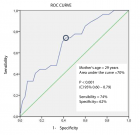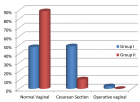Abstract
Case Report
Advancements in Clinical Research: Phases, Ethical Considerations, and Technological Innovations
Ashish Pandey*
Published: 25 September, 2024 | Volume 8 - Issue 3 | Pages: 084-086
Background: Clinical research is a vital component of medical advancements, contributing to the discovery of new treatments, procedures, and health interventions. This paper discusses the importance of clinical trials, the structure and phases of trials, ethical considerations in research, and the role of modern technologies in reshaping clinical trials.
Objective: This article aims to provide a comprehensive overview of the clinical trial process, ethical compliance, and the integration of technological advancements, with real-world examples and recent studies to support the discussion.
Methods: The article provides a descriptive analysis of the different types of clinical research, the various phases of clinical trials, and ethical considerations based on established guidelines such as the Declaration of Helsinki and the Belmont Report. It also examines how recent technological innovations, including AI, wearable devices, and Electronic Health Records (EHRs), have revolutionized the field.
Results: The integration of technology into clinical research has resulted in more efficient, data-driven, and patient-centric trials. Ethical compliance, guided by international regulations, remains a critical factor in ensuring patient safety and maintaining public trust in clinical research.
Conclusion: The future of clinical research relies heavily on technological innovation and strict adherence to ethical guidelines. As new treatments and therapies emerge, the structure of trials and the responsible use of technology will play an essential role in shaping the future of healthcare.
Read Full Article HTML DOI: 10.29328/journal.acr.1001102 Cite this Article Read Full Article PDF
Keywords:
Clinical research; Clinical trials; Phases of trials; Ethical considerations; Artificial intelligence; Technology in healthcare; Regulatory compliance
References
- Berger JS, Lichtenstein AH. Clinical trials and research: overview of the field. JAMA. 2019;321(8):787-796.
- Moher D, Liberati A, Tetzlaff J, Altman DG. Clinical trials: expanding into observational research. Lancet. 2018;371(9612):567-578.
- Rothman KJ, Greenland S. Epidemiology: an introduction. Oxford: Oxford University Press; 2019.
- Grady C. Clinical trials: methodological advances. N Engl J Med. 2020;372(2):123-131.
- Nissen SE, Wolski K. The evolving landscape of clinical trials. JAMA. 2021;324(12):1136-1143.
- Fleming TR. The critical role of Phase I clinical trials. Clin Trials. 2017;14(3):239-251.
- Jackson LA, Anderson EJ, Rouphael NG, Roberts PC, Makhene M, Coler RN, et al. An mRNA vaccine against SARS-CoV-2: Phase II trial results. N Engl J Med. 2020;383(20):1920-1931. Available from: https://doi.org/10.1056/nejmoa2022483
- Polack FP, Thomas SJ, Kitchin N, Absalon J, Gurtman A, Lockhart S, Perez JL, et al. Safety and efficacy of the BNT162b2 mRNA Covid-19 vaccine. N Engl J Med. 2020;383(27):2603-2615. Available from: https://doi.org/10.1056/nejmoa2034577
- Califf RM, Zarin DA, Kramer JM, Sherman RE, Aberle LH, Tasneem A. Characteristics of clinical trials registered in ClinicalTrials.gov, 2007-2010. JAMA. 2017;307(17):1838-1847.
- Kim ES, Bruinooge SS, Roberts S, Ison G, Lin NU, Gore L, et al. Broadening eligibility criteria to make clinical trials more representative: American Society of Clinical Oncology and Friends of Cancer Research joint research statement. J Clin Oncol. 2017;35(33):3737-3744. Available from: https://doi.org/10.1200/jco.2017.73.7916
- Sully BG, Julious SA, Nicholl J. A reinvestigation of recruitment to randomised, controlled, multicenter trials: a review of trials funded by two UK funding agencies. Trials. 2017;14(1):166. Available from: https://doi.org/10.1186/1745-6215-14-166
- Ioannidis JP. Why most published research findings are false. PLoS Med. 2005;2(8). Available from: https://doi.org/10.1371/journal.pmed.0020124
- Hingorani AD, Windt DA, Riley RD, Abrams K, Moons KG, Steyerberg EW, et al. Prognosis research strategy (PROGRESS) 4: stratified medicine research. BMJ. 2015;349.
- Wenner DM. The social value of knowledge and the responsiveness requirement for international research. Bioethics. 2016;30(4):260-267.
- McWilliams JM, Landon BE, Chernew ME, Zaslavsky AM. Changes in patients' experiences in Medicare accountable care organizations. N Engl J Med. 2014;371(18):1715-1724. Available from: https://doi.org/10.1056/nejmsa1406552
- Emanuel EJ, Wendler D, Grady C. What makes clinical research ethical? JAMA. 2000;283(20):2701-2711. Available from: https://doi.org/10.1001/jama.283.20.2701
- Kim C, Prasad V. Cancer drugs approved on the basis of a surrogate end point and subsequent overall survival: an analysis of 5 years of US Food and Drug Administration approvals. JAMA Intern Med. 2015;175(12):1992-1994. Available from: https://doi.org/10.1001/jamainternmed.2015.5868
- Chalmers I, Glasziou P. Avoidable waste in the production and reporting of research evidence. Lancet. 2009;374(9683):86-89. Available from: https://doi.org/10.1016/s0140-6736(09)60329-9
Figures:
Similar Articles
-
Advancements in Clinical Research: Phases, Ethical Considerations, and Technological InnovationsAshish Pandey*. Advancements in Clinical Research: Phases, Ethical Considerations, and Technological Innovations. . 2024 doi: 10.29328/journal.acr.1001102; 8: 084-086
Recently Viewed
-
Synthesis of Carbon Nano Fiber from Organic Waste and Activation of its Surface AreaHimanshu Narayan*,Brijesh Gaud,Amrita Singh,Sandesh Jaybhaye. Synthesis of Carbon Nano Fiber from Organic Waste and Activation of its Surface Area. Int J Phys Res Appl. 2019: doi: 10.29328/journal.ijpra.1001017; 2: 056-059
-
Obesity Surgery in SpainAniceto Baltasar*. Obesity Surgery in Spain. New Insights Obes Gene Beyond. 2020: doi: 10.29328/journal.niogb.1001013; 4: 013-021
-
Tamsulosin and Dementia in old age: Is there any relationship?Irami Araújo-Filho*,Rebecca Renata Lapenda do Monte,Karina de Andrade Vidal Costa,Amália Cinthia Meneses Rêgo. Tamsulosin and Dementia in old age: Is there any relationship?. J Neurosci Neurol Disord. 2019: doi: 10.29328/journal.jnnd.1001025; 3: 145-147
-
Case Report: Intussusception in an Infant with Respiratory Syncytial Virus (RSV) Infection and Post-Operative Wound DehiscenceLamin Makalo*,Orlianys Ruiz Perez,Benjamin Martin,Cherno S Jallow,Momodou Lamin Jobarteh,Alagie Baldeh,Abdul Malik Fye,Fatoumatta Jitteh,Isatou Bah. Case Report: Intussusception in an Infant with Respiratory Syncytial Virus (RSV) Infection and Post-Operative Wound Dehiscence. J Community Med Health Solut. 2025: doi: 10.29328/journal.jcmhs.1001051; 6: 001-004
-
The prevalence and risk factors of chronic kidney disease among type 2 diabetes mellitus follow-up patients at Debre Berhan Referral Hospital, Central EthiopiaGetaneh Baye Mulu,Worku Misganew Kebede,Fetene Nigussie Tarekegn,Abayneh Shewangzaw Engida,Migbaru Endawoke Tiruye,Mulat Mossie Menalu,Yalew Mossie,Wubshet Teshome,Bantalem Tilaye Atinafu*. The prevalence and risk factors of chronic kidney disease among type 2 diabetes mellitus follow-up patients at Debre Berhan Referral Hospital, Central Ethiopia. J Clini Nephrol. 2023: doi: 10.29328/journal.jcn.1001104; 7: 025-031
Most Viewed
-
Evaluation of Biostimulants Based on Recovered Protein Hydrolysates from Animal By-products as Plant Growth EnhancersH Pérez-Aguilar*, M Lacruz-Asaro, F Arán-Ais. Evaluation of Biostimulants Based on Recovered Protein Hydrolysates from Animal By-products as Plant Growth Enhancers. J Plant Sci Phytopathol. 2023 doi: 10.29328/journal.jpsp.1001104; 7: 042-047
-
Sinonasal Myxoma Extending into the Orbit in a 4-Year Old: A Case PresentationJulian A Purrinos*, Ramzi Younis. Sinonasal Myxoma Extending into the Orbit in a 4-Year Old: A Case Presentation. Arch Case Rep. 2024 doi: 10.29328/journal.acr.1001099; 8: 075-077
-
Feasibility study of magnetic sensing for detecting single-neuron action potentialsDenis Tonini,Kai Wu,Renata Saha,Jian-Ping Wang*. Feasibility study of magnetic sensing for detecting single-neuron action potentials. Ann Biomed Sci Eng. 2022 doi: 10.29328/journal.abse.1001018; 6: 019-029
-
Pediatric Dysgerminoma: Unveiling a Rare Ovarian TumorFaten Limaiem*, Khalil Saffar, Ahmed Halouani. Pediatric Dysgerminoma: Unveiling a Rare Ovarian Tumor. Arch Case Rep. 2024 doi: 10.29328/journal.acr.1001087; 8: 010-013
-
Physical activity can change the physiological and psychological circumstances during COVID-19 pandemic: A narrative reviewKhashayar Maroufi*. Physical activity can change the physiological and psychological circumstances during COVID-19 pandemic: A narrative review. J Sports Med Ther. 2021 doi: 10.29328/journal.jsmt.1001051; 6: 001-007

HSPI: We're glad you're here. Please click "create a new Query" if you are a new visitor to our website and need further information from us.
If you are already a member of our network and need to keep track of any developments regarding a question you have already submitted, click "take me to my Query."






















































































































































